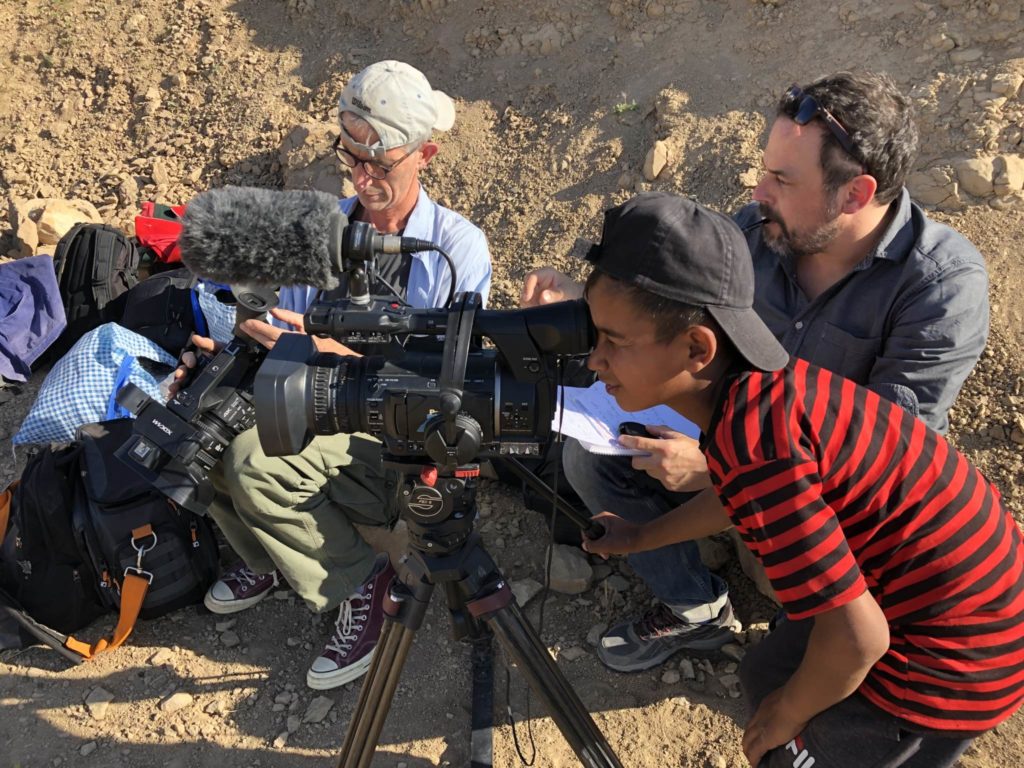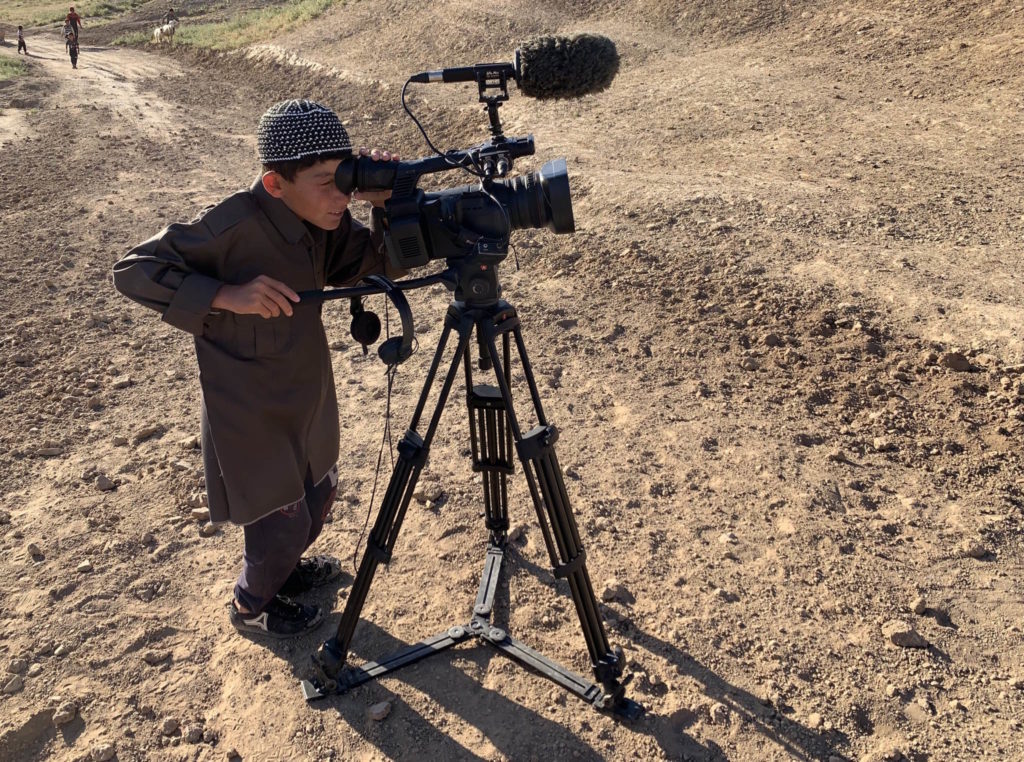[mks_dropcap style=”letter” size=”48″ bg_color=”#ffffff” txt_color=”#000000″]F[/mks_dropcap]rancis Alÿs has made quite a name for himself around the globe. The Belgian-born and Mexico-based creator is well known in the art industry for such performances, as pushing a block of ice through the streets of Mexico City for 9 hours and carrying a leaking can of green paint along the armistice border in Jerusalem. The past few decades have been nothing short of fruitful for this world-traveling artist – his exhibitions have been held at the MoMA, Tate Modern, and currently, at the Eye Film Museum in Amsterdam, while the European premiere of his latest film “Sandlines” took place at this year’s International Film Festival in Rotterdam.
It’s 11 AM in Mexico City when Francis Alÿs answers my call. “I just came back from the Sundance film festival last night,” he tells me over the phone. We kick off the conversation with a mutual sigh about the events that unfortunately overlapped – the world premiere of “Sandlines” (read about the film here) took place in Utah, while the European premiere was held at the International Film Festival Rotterdam (IFFR) around the same time. Despite having his latest project screened at prestigious film festivals, Alÿs seems simple, passionate, and sincere during our conversation. He is even reluctant to call himself a director. He prefers the broader title of a creator instead.
When I hear the hesitation in his voice, I nod in understanding. After all, it is hard to attach a particular label to “Sandlines.” The boundary between documentary and narrative fiction is so intricately fused that the artist himself can only define his project as “docufiction.” The film portrays the history of Iraq in the last century, from the Sykes/Picot agreement signed in 1916 to the political turmoil of today. It is the children of the tiny village named Nerkzlia who re-enact the history and make it into a game of their own.
“I could somewhat recognize my own story”
Children’s games are indeed a recurring topic in his art – it is the name and the content of Alÿs’ extensive collection, currently exhibited at the Eye Film Museum. Started in 1999, the series of short clips portray children’s games from all around the world. I express my amazement about the exhibition to the artist himself, since the universality of the games in various nations of the globe is striking – as if they were a part of a collective unconscious. Francis Alÿs shares this amazement with me: “I could go from Argentina to Iraq and find essentially the same mechanics and meaning of the games.” According to the artist, he could not trace any evident tradition of transmitting those games across borders.
When the topic of traveling across borders comes up, I cannot fathom the emotional burden Alÿs faces when working with children in unfortunate conditions, his latest film included. For Alÿs, this is the 7th project he has done in Iraq. His other works are more focused on addressing the tragedy of the situation there, as he first came to the country to document children’s lives in refugee camps. Contrastingly, “Sandlines” has a tangible aura of joy, despite the weighty political issues it touches upon.

“For a Westerner with good intentions, trying to bring help whichever way possible, it was surprising to find serenity and happiness in that village,” he admits. The village in which “Sandlines” was filmed, Nerkzlia, is relatively untouched by the conflicts the country is undergoing. The most significant interference of the nearby presence of the Islamic State in the villagers’ lives is that the children have not gone to school for 2.5 years, as the teachers are not able to reach them. “The children live in a sort of distant, protected environment with their sheep, their families, their friends, and they are disconnected from the rest of the world.” That is apparent in the film as well – the children seem entirely unaware of the existence of Iraq as a state. For them, their country is their village.
Needless to say, they were not aware of Iraq’s history either, and it was not Alÿs’ aim to teach them. For him, it was the interpretation of historical events by a child’s imagination that interested him. “Of course, they did not know who the Lawrence of Arabia or even Saddam Hussein was. I wanted to offer them that character and see what they were going to make of it,” he shares with audible admiration in his voice. I hear a soft chuckle on the other side of the phone and soon learn the reason for it – according to Alÿs, half of the film was not even meant to be the way it turned out.

“I was only the idea and the catalyser, and [the children] were the ones who gave me the content. I had a neat little script, but from the second day of the shooting, I started rewriting it every day. It was a series of improvisations that would lead to the next scene.” The artist’s gratitude and fascination with the children of the village are palpable even through a phone call. Alÿs actually let them do the camera work at times – in fact, their desire to do so was the perfect outcome for him.
His excitement is especially apparent when he talks about the involvement of the girls of the village. Despite his fascination with that society, he admits that many things there, such as the women’s role, would be frowned upon in the Western world. However, in the case of “Sandlines,” after seeing the results of the first shooting period, all of the girls suddenly wanted to participate as well. “It is one of the few times it has happened to me, as in many countries, the culture itself makes it very difficult for girls to participate. Somehow, we passed the test,” the artist says.
For Alÿs, the question still lingering in his mind when talking about the living conditions of the Iraqi children is “What is the best for them?” In his opinion, one should live there for a very long time to decide what aspects of their society should be changed, and what should be left alone. He’s not sure whether they should be brought closer to Western civilisation by, for instance, giving them Internet access. After all, life seems happy there – the children herd their sheep, play with their friends, and live a seemingly carefree life. “I hope you could sense that in the film – this sort of innocence that is often lost in our society from an early age.”
“I think adults should be faithful to the children they were. That is an incredible achievement. I believe you have to re-remember and learn to trust that moment – the most precious one of your existence.”
“I could somewhat recognize my own story,” Alÿs tells me when discussing the children’s lives in the village. Having grown up in an isolated place in the Belgian countryside, the artist drenched the project in his own childhood nostalgia. “Whenever I am in doubt, I revisit that period of early life, and that is where I usually find the answer.” The influence of his own experiences in “Sandlines” is no exception – according to Alÿs, 80% of his artistic inspiration comes from his childhood.
The topic of childhood inevitably brings me to my last question – what is the one thing that adults should learn from children? Alÿs sighs and laughs: “That’s a tough one.” Despite the remark, the answer seems to have been on the tip of his tongue all along. “I think adults should be faithful to the children they were. That is an incredible achievement. I believe you have to re-remember and learn to trust that moment – the most precious one of your existence.”
This interview is part of Medium’s International Film Festival Rotterdam 2020 coverage.
Cover: Francis Alÿs





